
Patna: The BJP’s insistence that history be rewritten with more emphasis on Hindu kings who resisted Muslim invasion than on the invaders themselves has received a thumbs down from Bihar Chief Minister Nitish Kumar, whose JD(U) is the saffron party’s largest alliance partner.
Kumar was asked about the debate, especially in academic circles, that has been triggered by the recent statement of Union Home Minister Amit Shah at the launch of a book on history written by a medical professional.
How can you change history? Is it possible to do so, quipped Kumar with exclamatory laughter in reply to the question that was posed on the sidelines of his weekly public interaction programme here on Monday.
Although the septuagenarian dismissed the issue with his curt reply, the message was loud and clear.
History, incidentally, has often been the stick that the BJP and the JD(U) have used to beat each other with.
Last year, a BJP MLA Haribhushan Thakur Bachaul, who is seen as a Hindutva hardliner, had come out with the suggestion that Bakhtiyarpur, a sleepy town on the outskirts of the state capital where the chief minister was born, be renamed after the JD(U) leader.
Kumar had summarily rejected the suggestion terming it as faltu baat (rubbish).
Bakhtiyarpur is said to have been named after Bakhtiyar Khilji, the 12th-century Afghan general who had marauded Bihar and Bengal and whose infamous exploits include the razing of the centre of higher learning at Nalanda where Buddhists from far and wide used to pursue their studies.
The JD(U), seemed intent on giving it back to its domineering coalition partner when the party’s parliamentary board chief Upendra Kushwaha carried out a sustained campaign against the alleged denigration of Emperor Asoka.
The legendary king of Magadha was the grandson of Chandragupta Maurya, who was born in a poor family of shepherds and went on to found the Maurya dynasty which the BJP also seeks to reminisce with a lot of nationalistic pride.
However, because of Chandragupta Maurya’s humble origins, the king and his descendants have come to be seen as cultural icons of sort for the OBCs who dominate politics in the state.
Uttar Pradesh-based playwright Daya Prakash Sinha, who got selected for the Sahitya Akademi award this year, had stoked a controversy by drawing a parallel between Asoka and Mughal Emperor Aurangzeb, who is reviled by the BJP and its ilk as a bigot.
Sinha had contended that piety was used by both rulers as a cloak for their unbridled ambition, though unsurprisingly, the nuanced view found no takers in the political world.
Kushwaha raised a shrill campaign, accusing Sinha of having BJP links and demanding withdrawal of the literary honour bestowed upon him.
The BJP initially sought to buy time but later lost its nerve and its state unit chief Sanjay Jaiswal lodged a police complaint accusing Sinha of falsely claiming to be associated with the party and then giving it a bad name by casting aspersions on Asoka the pride of Bihar.
The controversy has, since, seemed to have been given a quiet burial. But the chief minister’s stance suggests that though his alliance with the BJP may be entering its fourth decade, ideological fault lines remain as pronounced as ever.



